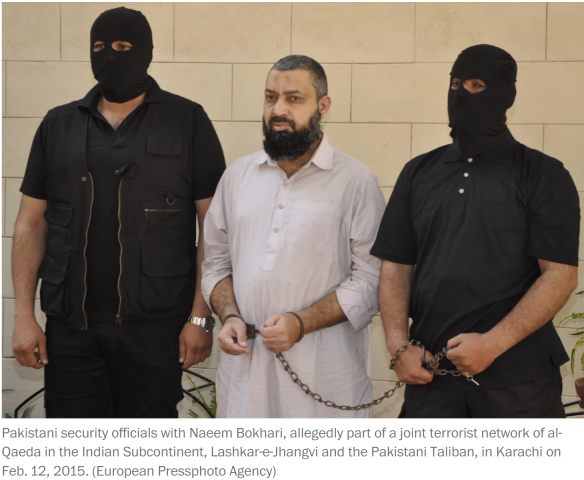Karachi, Pakistan- Five years after most senior al-Qaeda leaders are thought to have fled this port city, officials in Karachi worry that the organization is regrouping and finding new support here and in neighboring Afghanistan.
They are especially concerned about the recruitment of potential foot soldiers for the next major terrorist attack.
The resurgence has been managed by a South Asian offshoot called al-Qaeda in the Indian Subcontinent (AQIS), created by al-Qaeda’s top leader Ayman al-Zawahiri in 2014 in order to slow advances by rival ISIS militants in the region.
Initially, AQIS struggled to gain traction in Pakistan; it has been the principal target of President Obama’s drone-strike strategy in the country’s northwestern tribal belt.
However AQIS is now finding its footing in southern Pakistan, powered by fresh recruits and budding alliances with other militant organizations.
“They are making a comeback of sorts,” said Saifullah Mehsud, executive director of the FATA Research Center, which monitors militant groups. “But it’s a different, more localized al-Qaeda.”
After the fall of Afghanistan’s Taliban government in 2001, many al-Qaeda leaders spilled into northwest Pakistan or attempted to blend in in Karachi, a bustling city of more than 20 million residents.
A significant number of those core leaders were eventually killed or captured, or fled to the Middle East, officials said.
Nonetheless, the formation of AQIS is again allowing al-Qaeda to tap into Karachi’s wealth and network of religious schools in search of recruits and technical expertise and sparking deadly clashes with Pakistani security forces.
“The core al-Qaeda, the thinkers and planners, are not coming to the front right now, but they are giving directions, and the local boys are going in big numbers,” said one counterterrorism official in Karachi who asked to remain anonymous because he was not authorized to speak to the media.
While Pakistani officials remain confident that al-Qaeda probably cannot pull off another 9/11-style attack on the United States, there is concern that the group is, as one official put it, “planning something big.”
The official added that it is unclear, however, whether such an attack would be aimed at Pakistan, another country in South Asia or maybe the West.
Those concerns reflect assessments from U.S. commanders in Afghanistan, where there are also signs that elements of al-Qaeda are trying to come together.
A 30-square-mile training camp was discovered in Kandahar province in October, and last month U.S. and Afghan special operations forces freed a kidnapped Pakistani from an al-Qaeda-linked camp in Paktia province.
“They are looking to nestle in with the Taliban so they have some level of sanctuary,” said Brig. Gen. Charles H. Cleveland, chief spokesman for the U.S.-led coalition in Afghanistan.
“Ultimately, what we think al-Qaeda gets out of this relationship is, if the Taliban can provide them some ungoverned space that allows al-Qaeda space to really conduct their global operations.”
In Pakistan, officials say al-Qaeda is also re-adapting through enhanced alliances with established militant groups, including the Sunni-dominated Pakistani Taliban and “Lashkar-e-Jhangvi,” a sectarian group that had been focused on attacking Shiite Muslims.
The coordination comes as Pakistan’s military has stepped up its operations against various militant groups, prompting them to seek out support from al-Qaeda “for survival,” said one Pakistani law enforcement official who also spoke on the condition of anonymity.
